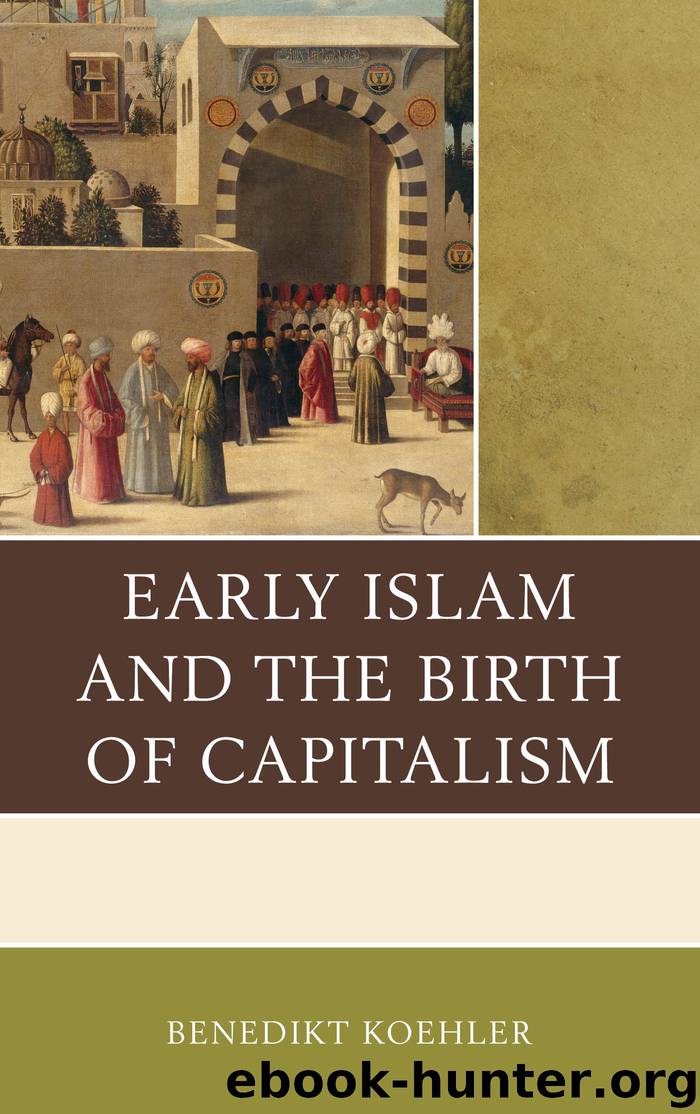Early Islam and the Birth of Capitalism by Benedikt Koehler

Author:Benedikt Koehler
Language: eng
Format: epub
Tags: undefined
Publisher: Lexington Books
Published: 2012-04-20T04:00:00+00:00
Muqairiq and Muhammad
Muhammad laid the foundation of Islam’s charitable sector with Judaic practices before his eyes.[6] Muqairiq, a Jewish recruit to Muhammad’s army who was fatally wounded at the battle of Uhud, bequeathed to Muhammad seven properties with the dying wish he use them for the promotion of Islam. Thus passed into Muhammad’s possession properties subject to constraints predetermined by the donor. A grateful Muhammad singled out Muqairiq for praise by calling him the “best of the Jews.” Muqairiq had exposed Muhammad to a new concept, one that he apprehended quickly and soon adapted to his own uses. Muhammad applied the principle of tied giving after the conquest of Khaybar when he vested his companions with land grants—but stipulated how harvests were to be distributed. Umar (and others) thus came to possess large swaths of land, but with property rights constrained in a way that in practice he was a trustee rather than an owner. Some traditions claimed Umar had taken the initiative to endow a waqf and had received Muhammad’s express permission.[7] In any event, endowments granted by Muhammad after the conquests of Khaybar were waqfs in all but name, and a formative moment for the evolution of waqfs took place through the settlement of Muhammad’s estate when his successors refined the concept.
Muhammad’s executor Abu Bakr, faced with the decision what to do with Muhammad’s properties in Medina, Khaybar, and Fadak, looked for guidance in the Bible; given Muhammad was a prophet, he inferred his estate should be settled in the same way as that of every other prophet, and, since no prophet had ever bequeathed to his family conspicuous wealth, it followed that Muhammad’s next of kin had no claim on his assets. Abu Bakr reasoned Muhammad had ruled in his capacity as Messenger of God, which implied his assets belonged to his office rather than to his person. Thus Abu Bakr established property could be held either in a personal capacity or on behalf of a third party, and this fine distinction he applied not only to passing on power but also to passing on property. Into Islamic legal thinking at that moment entered a subtle but crucial legal distinction between personal and fiduciary ownership.
Abu Bakr put this approach into practice in settling his own estate. Abu Bakr as caliph never took advantage of his official position to enrich himself, but his personal property, on the other hand, he vested in a waqf where he nominated his family members as beneficiaries. Abu Bakr, in other words, created a family trust fund, and anyone who wished to keep wealth in the family copied this example. His successor Umar applied the concept of fiduciary ownership to virtually all of the booty that came into his possession in his capacity as caliph. All of Egypt, recently conquered, Umar vested in a waqf and designated as beneficiary the umma. Osman refused to respect the distinction between personal and fiduciary property (and thereby precipitated his overthrow), but he, too, was conversant with the concept of vesting property for public use.
Download
This site does not store any files on its server. We only index and link to content provided by other sites. Please contact the content providers to delete copyright contents if any and email us, we'll remove relevant links or contents immediately.
International Integration of the Brazilian Economy by Elias C. Grivoyannis(111059)
The Radium Girls by Kate Moore(12028)
Turbulence by E. J. Noyes(8049)
Nudge - Improving Decisions about Health, Wealth, and Happiness by Thaler Sunstein(7707)
The Black Swan by Nassim Nicholas Taleb(7129)
Rich Dad Poor Dad by Robert T. Kiyosaki(6633)
Pioneering Portfolio Management by David F. Swensen(6301)
Man-made Catastrophes and Risk Information Concealment by Dmitry Chernov & Didier Sornette(6019)
Zero to One by Peter Thiel(5802)
Secrecy World by Jake Bernstein(4753)
Millionaire: The Philanderer, Gambler, and Duelist Who Invented Modern Finance by Janet Gleeson(4478)
The Age of Surveillance Capitalism by Shoshana Zuboff(4293)
Skin in the Game by Nassim Nicholas Taleb(4249)
The Money Culture by Michael Lewis(4207)
Bullshit Jobs by David Graeber(4190)
Skin in the Game: Hidden Asymmetries in Daily Life by Nassim Nicholas Taleb(4007)
The Dhandho Investor by Mohnish Pabrai(3765)
The Wisdom of Finance by Mihir Desai(3747)
Blockchain Basics by Daniel Drescher(3583)
